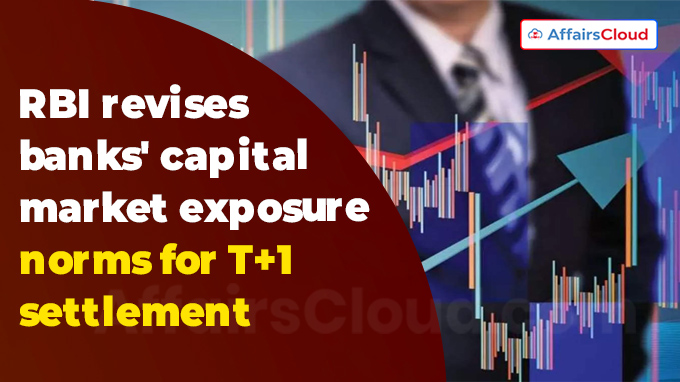 On 3rd May 2024, the Reserve Bank of India (RBI) has revised the guidelines for custodian banks to issue Irrevocable Payment Commitments (IPCs) in light of the T+1 settlement regime for stocks.
On 3rd May 2024, the Reserve Bank of India (RBI) has revised the guidelines for custodian banks to issue Irrevocable Payment Commitments (IPCs) in light of the T+1 settlement regime for stocks.
- The maximum intraday risk for custodian banks issuing IPCs will be considered as capital market exposure (CME) at 30% of the settlement amount.
Points to note:
i.The 30% limit is based on an assumption of a 20% downward price movement of equities on T+1, with additional 10% margin for further downward movement.
ii.Previously, the risk mitigation measures were based on T+2 rolling settlement for equities (T – trade day).
Key Points:
i.Exposure under T+1 settlement cycle is normally intraday. If exposure remains at end of T+1, the bank must maintain capital based on outstanding market exposure.
ii.Only custodian banks with agreements giving them rights over securities for receiving settlement payout can issue IPCs.
- This requirement will not be insisted on pre-funded transactions.
- The clear rupee funds are available in the customer’s account or, in case of foreign exchange deals, the bank’s nostro account has been credited before the issuance of the IPC
iii.In case margin is paid in cash, the exposure will stand reduced by the amount of margin paid. In case margin is paid by way of permitted securities to Mutual Funds / Foreign Portfolio Investors(FPI), the exposure will stand reduced by the amount of margin after adjusting for haircut as prescribed by the Exchange on the permitted securities accepted as margin.
v.Underlying exposures of banks to counterparties from intraday CME subject to limits under Large Exposure Framework.
Click Here for Official Notification
RBI lifts curb on Bajaj Finance’s lending products ‘eCOM‘, ‘Insta EMI Card’
On 2nd May 2024, RBI lifted the restrictions on Bajaj Finance Limited’s Insta EMI Card and its e-commerce platform, eCOM.
Background:
i.In November 2023, RBI in exercise of its powers under section 45L(1)(b) of the Reserve Bank of India Act, 1934, has directed Bajaj Finance to stop sanction and disbursal of loans under its two lending products ‘eCOM’ and ‘Insta EMI Card’,
ii.The action was taken due to non-adherence to the extant provisions of Digital lending guidelines of RBI, particularly non-issuance of Key Fact Statements (KFS) to the borrowers and deficiencies in the KFS issued in respect of other digital loans offered by Bajaj Finance.
Note: RBI’s digital lending guidelines mandate lenders to disclose all fees and charges upfront to borrowers and outline recovery practices for defaults.
Recent Related News:
i.RBI issued Master Direction – Reserve Bank of India (Asset Reconstruction Companies) Directions, 2024, under which the Minimum Capital Requirement for ARCs raised from Rs 100 crore to Rs 300 crore.
ii.RBI has issued Guidelines on import of gold by Tariff Rate Quota (TRQ) holders under the India-United Arab Emirates (UAE) Comprehensive Economic Partnership Agreement (CEPA) as notified by the International Financial Services Centres Authority (IFSCA).
About Reserve Bank of India (RBI):
Governor – Shaktikanta Das
Deputy Governors – Swaminathan Janakiraman, Michael Debabrata Patra, M. Rajeshwar Rao, T. Rabi Sankar
Establishment– 1st April 1935
Headquarters– Mumbai, Maharashtra




